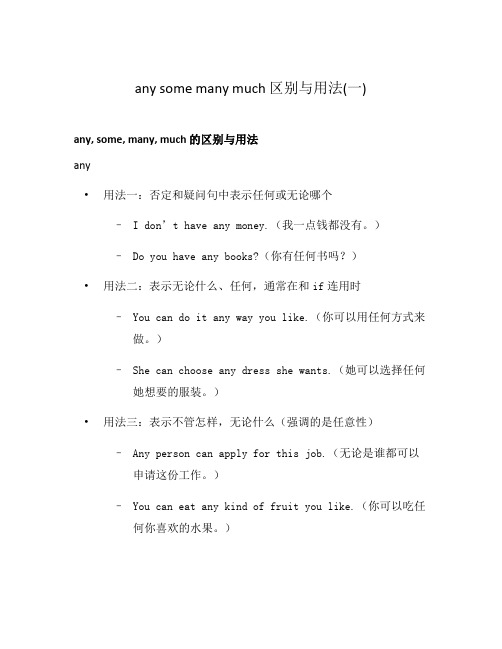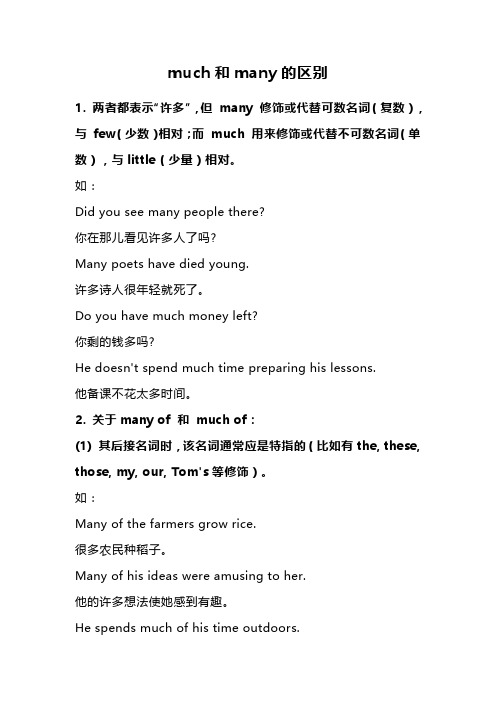many和much用法
any some many much 区别与用法(一)

any some many much 区别与用法(一)any, some, many, much 的区别与用法any•用法一:否定和疑问句中表示任何或无论哪个–I don’t have any money.(我一点钱都没有。
)–Do you have any books?(你有任何书吗?)•用法二:表示无论什么、任何,通常在和if连用时–You can do it any way you like.(你可以用任何方式来做。
)–She can choose any dress she wants.(她可以选择任何她想要的服装。
)•用法三:表示不管怎样,无论什么(强调的是任意性)–Any person can apply for this job.(无论是谁都可以申请这份工作。
)–You can eat any kind of fruit you like.(你可以吃任何你喜欢的水果。
)some•用法一:表示一些、若干,通常用于肯定句中–I bought some flowers for my mother.(我给我妈妈买了一些花。
)–Can you give me some advice?(你可以给我一些建议吗?)•用法二:表示某种(不确定或未指明的数量)–I need some time to think about it.(我需要一些时间来考虑。
)–She wants to buy some clothes at the mall.(她想在商场买些衣服。
)many•用法一:表示许多、很多,用于可数名词复数形式中–There are many students in the classroom.(教室里有很多学生。
)–He has visited many countries.(他去过很多国家。
)•用法二:表示多次(表示频繁或重复)–She has been to Europe many times.(她去欧洲很多次。
someanymanymuch区别

04
实例分析
some的实例分析
总结词
表示“一些”
VS
详细描述
在句子中,some可以表示“一些”,用于 修饰可数名词或不可数名词。例如,“I have some books.”表示“我有一些书”。
anyone的实例分析
总结词
表示“任何人”
详细描述
在句子中,anyone可以表示“任何人”, 用于否定或疑问句中。例如,“Do you know anyone who can help me?”表示 “你认识能帮助我的人吗?”。
any的用法
any用于肯定句和否定句,表示“任 何”,可修饰可数名词或不可数名词。
03
常见错误与注意事项
混淆用法
总结词
混淆some、any、no的用法
详细描述
some和any常用于肯定句和一般疑问句,no常用于否定句。但在表示请求或建议的疑问句中,常用 some而不用any。
语境选择错误
总结词
some、 anymanymuch区别
• 定义与含义 • 用法与区别 • 常见错误与注意事项 • 实例分析
目录
01
定义与含义
some
总结词
表示“一些”,用于可数或不可数 名词
详细描述
some用于肯定句中,表示“一 些”,可数名词和不可数名词都可 以使用。
anyone
总结词
表示“任何人”
详细描述
anyone的用法
anyone用于否定及疑问句,表示“任何人”,一般指人。
many与much的区别
many的用法
many修饰可数名词复数,表示“许 多”。
much的用法
much修饰不可数名词,表示“许多” 。
any,much,many,lots of,a lot of,some 的用法

any,much,many,lots of,a lot of,some 的用法some和any:1.some和any都可指“一些”,但some常用于肯定句中,any常用于否定句、疑问句、和条件句中。
两者都可做主语、宾语和定语。
2.some有时也用于疑问句,表示说话者希望对方给予肯定的回答、邀请或料想对方会做肯定的回答,也可表示建议。
any有时也可用于肯定句中,表示“任何一个”,“任何一些”;not …any=no比如:Could I have some beer please ?(表明了说话者的礼貌和肯定的语气)She has any number of things she must do today.她今天又数不清的事要做。
3.“some of + …”结构后常跟可数名词的复数,此结构作主语时,谓语动词用复数;跟不可数名词,谓语动词用单数。
any后跟复数可数名词,any如若表示“任何一个”,谓语动词用单数,表示“任何一些”,谓语动词用复数,any后跟不可数名词,谓语动词用单数。
4.some和any既可以修饰、代替可数名词复数(作主语谓语用复数),也可以修饰或代替不可数名词与可数名词单数(作主语谓语用单数)。
many和much:1.many和much是表示数量的不定代词,在句中既可以充当名词,也可以充当形容词,可作主语、宾语、定语、表语等,意思为“许多”、“大量”。
many修饰或代替可数名词,much 修饰或代替不可数名词。
2.many作主语时谓语动词用复数,much作主语时谓语动词用单数。
名词前若有the/my/your/our/their/this/that/it/these/those等,此时不能直接用many/much,需用many of/much of。
3.many ,much前可有as、so、too、how等进行修饰;the,these,those可以修饰many;the,this,that可修饰much。
25many和much的用法(作形容词和代词)

25many和much的用法(作形容词和代词)第一篇:25 many和much的用法(作形容词和代词)many和much的用法(作形容词和代词)A many和much many(形容词)用在可数名词之前。
much (形容词)用在不可数名词之前。
He didn’t make many mistakes.他没犯多少错。
We haven’t much coffee.家里的咖啡不多了。
many和much的比较级和最高级形式相同,都是more和most:more mistakes/coffee更多的错误/咖啡most men/damage 几乎全部的男士/几乎所有的损害 many,much,more,most可作代词使用:He gets a lot of letters but she doesn’t get many.他收到的信很多,可她的信不多。
You have a lot of free time but I haven’t much.你有许多空闲时间,可我没有。
more和most的用法较灵活,many和much在否定动词后面用得比较多(见上文的例子),但many和much在肯定动词和疑问动词后用法较受限制。
B many和much与肯定动词连用many前加上a good/great时可与肯定动词连用。
many与much用so/as/too修饰时也可以与肯定动词连用。
I made a good many friends there.我在那里交了许多朋友。
He has had so many jobs that.他做过了这么多种工作,以致…… She read as much as she could.她尽量多读书。
They drink too much(gin).他们(杜松子酒)喝得太多了。
many是宾语或宾语的一部分而前面不加任何修饰语时,常常被 a lot/lots of(+名词)或a lot,lots(代词)代替。
much和many的区别

much和many的区别1. 两者都表示“许多”,但many 修饰或代替可数名词(复数),与few(少数)相对;而much 用来修饰或代替不可数名词(单数),与little(少量)相对。
如:Did you see many people there?你在那儿看见许多人了吗?Many poets have died young.许多诗人很年轻就死了。
Do you have much money left?你剩的钱多吗?He doesn't spend much time preparing his lessons.他备课不花太多时间。
2. 关于many of 和much of:(1) 其后接名词时,该名词通常应是特指的(比如有the, these, those, my, our, Tom's等修饰)。
如:Many of the farmers grow rice.很多农民种稻子。
Many of his ideas were amusing to her.他的许多想法使她感到有趣。
He spends much of his time outdoors.他很多时间都在户外度过。
Much of the land was flooded.大片土地被水淹没。
(2) 如果名词没有表特指的限定词,通常就不用of。
Many和Much的用法区别如:误:She didn't eat much of breakfast.正:She didn't eat much breakfast.她没有吃多少早餐。
误:There aren't many of large glasses left.正:There aren't many large glasses left.大玻璃杯剩下的不多了。
(3) 如果用了介词of又没有特指限定词,通常是不可以的。
如:误:Many of students have read it.正:Many of the students have read it.许多学生读过它。
词汇常考方式和语法混淆点many和much

词汇常考方式和语法混淆点many和much话题:副词动词教育学习今天跟大家来讲解的是many和much的用法。
一、many修饰可数名词复数,much修饰不可数名词,用于否定句或疑问句中否定句:Ididn’thavemuchmoney.疑问句:Howmucchwaterdoyouneed?Aretheremanystudentsintheclass?as /so/too后面:TherearesomanyparksinLondon.二、在肯定句中,我们一般用alotof、lotsof,一般我们不用many和much。
alotof、lotsof,同样也可以用于疑问句中,他们即可以修饰可数名词,也可以修饰不可数名词。
Aretherelotsofpeopleintheclass?Aretherealotofpeopleintheclass?在KET考试中,many和much一般会与可数名词和不可数名词一起出现,考查谁接可数谁接不可数;还会与比较级more和最高级most一起出现,成为考点。
常常在阅读的Part5中会考到。
三、牛刀小试1、Therearesomany/muchkindsofmusic.2、Iwanttoselllotsof/manybooks.3、Idrinkalotof/muchwatereveryday.本周讲解的就是在KET考试中,大家最容易混淆的like、wouldlike的用法一、like表示某人喜欢某事或者某物,或者喜欢做的事情(这种情况下like后面通常+动词ing形式)比如:Ilikeyournewclothes.Haveyouhadthemlong?Ilikegoingtothecine ma,butIdon’tlikefantasyfilmsverymuch.二、wouldlike是KET 的高频考点,但是很多孩子不明白wouldlike到底是个什么意思。
在这里阮晶老师可以告诉大家,如果你见到了wouldlike,那么在某些情况下就可以跟want互换,只不过want表达的语气更加强烈一些而已。
many、much、some、any、a lot of 、a little的用法
many、much、some、any、a lot of 、a little的用法● a lot of = lots of,可修饰可数或不可数名词,意为“许多”,“大量的”,相当于many或much。
a lot, a lot of, lots of通常用于肯定句,否定句中一般用many或much,eg: There’s a lot of work to do and a lot of people have been sent there. 有许多事情要做,许多人已派去那里了。
●a little, a few:一些。
a little形容不可数名词、形容词和a few形容可数名词。
eg: I have a little money; I'm a little hungry;I have a few books。
●little, few,指几乎没有,little形容不可数名词,few形容可数名词much,many,表示很多,前者用于形容词比较级及不可数名词,后者用于修饰可数名词;eg: It's much easier now; There're much water in the tank; I have many books;●some, any,表示一些,前者用于肯定陈述及委婉请求,后者用于否定句及一般疑问句;eg: I have some books; Would you like some coffee? I don't have any books; Is there any coffee in your cup?●plenty of稍微复杂一点,用于口语表达时修饰不可数名词的程度而非数量多一些,但它也可以修饰可数名词,只是情况稍少些。
much of和many of的用法
much of和many of的用法Much of和many of是英语中非常常用的表达方式,它们经常出现在口语和书面语中。
本文将会详细介绍much of和many of的用法,让您更好地了解它们的含义、用法和实际使用中需要注意的事项。
1. much of的用法。
(1)作为限定词,much of常用来修饰不可数名词。
例如:Much of the water in the lake has been polluted.这个湖中的水大部分已经被污染了。
Much of his money was spent on travelling.他的钱大部分用来旅游了。
(2)much of用来修饰复数名词时,通常需要加上限定词或数词,并使用of构成短语。
例如:Much of the food on the table is delicious. (;餐桌上的食物很好吃。
)。
Much of the furniture in the room is old. (房间里的很多家具都很旧了。
)。
(3)在疑问句和否定句中,可以用much of来表示一种非常的方式。
例如:Much of the work can't be done without his help. (大部分工作没有他的帮助是不能完成的。
)。
2. many of的用法。
(1)many of常用来修饰可数名词,表示数量多。
例如:Many of the students in this class are from Europe.这个班级里的很多学生都来自欧洲。
Many of the houses in this town were destroyed by the earthquake.这个城镇里的很多房屋都被地震摧毁了。
(2)在疑问句和否定句中,many of表示的是一个数量大的概念。
例如:Many of the shops are closed on Sundays. (周日很多商店都关闭。
many much a lot of的用法和区别
many much a lot of的用法和区别
much a lot of是量词性质的短语,两者都常用于正面的表达,多指
形容某物的数量多,但much a lot of的用法各有不同。
一、much的用法。
1、much的用法比较多,含义也比较丰富。
2、much作形容词时,可用于修饰可数名词的复数形式,表示“许多”的意思。
例如:There are much flowers in the vase.
3、much也可用于修饰不可数名词,意为“大量的”。
例如:We have much money for this project.
4、much也可用于做副词,修饰形容词和副词,表示“非常”、“十分”的意思。
例如:She is much better now.
二、a lot of的用法。
1、a lot of是一个固定短语,常用于正面的表达,表示“很多”的
意思。
例如:There are a lot of books on the shelf.
2、a lot of的后面可以跟可数名词的复数形式,也可以跟不可数名词。
例如:I have a lot of friends. / They have a lot of money.
3、a lot of后面也可以跟表示数量的量词,如many, few, some。
例如:There are a lot of many people in this room.
综上,much和a lot of都可以用来表示“许多”的意思,但是要根据语境和句子结构来选择正确的用法。
few little many much的用法
一、few的用法1. few意为“少数的,很少的”,常用来修饰可数名词的复数形式。
例如:There are few people in the park.(公园里的人很少)。
2. few还可以用在表示否定情况下,表示“几乎没有”。
例如:I have few friends in this city.(我在这个城市几乎没有朋友)。
二、little的用法1. little也表示“少数的”、“几乎没有”,但它是修饰不可数名词。
例如:There is little milk in the bottle.(瓶子里的牛奶很少)。
2. little还可以用来表示“小”,“微不足道”的意思。
例如:It's of little importance.(这很不重要)。
三、many的用法1. many意为“许多的,很多的”,常用来修饰可数名词的复数形式。
例如:There are many books on the shelf.(书架上有很多书)。
2. many还可以用来表示“多少”这样的疑问。
例如:How many students are there in the classroom?(教室里有多少学生?)四、much的用法1. much表示“许多的”、“大量的”,常用来修饰不可数名词。
例如:There is much work to do.(有很多工作要做)。
2. much还可以用来表示“很多”、“多少”这样的疑问。
例如:How much money do you have?(你有多少钱?)以上便是few、little、many、much这四个词的基本用法。
需要特别注意的是,当这四个词修饰可数名词时,通常需要加上定冠词或者不定冠词。
例如:There are few books on the shelf.(书架上的书很少);There are few a books on the shelf.(书架上有几本书)。
- 1、下载文档前请自行甄别文档内容的完整性,平台不提供额外的编辑、内容补充、找答案等附加服务。
- 2、"仅部分预览"的文档,不可在线预览部分如存在完整性等问题,可反馈申请退款(可完整预览的文档不适用该条件!)。
- 3、如文档侵犯您的权益,请联系客服反馈,我们会尽快为您处理(人工客服工作时间:9:00-18:30)。
Many和Much用法
① many和much都作“许多”解,但many用于修饰可数名词,而much修饰
不可数名词。例如: 1. China has many oil fields. 中国有许多油田。 2. In our
view, there is much oil here. 在我们看来,这里有许多石油。
② 代词many和名词much用法举例: 1. Many of the students want to sum up the
past experience before going on. 许多学生(原意为:学生中间有许多人)要总
结一下过去经验在继续干。 2. Much of the waste acid is utilized. 废酸中大部
分被利用了。
③“much(副词)+比较级”作“„„得多”解: 1. The sun is much large than the
moon. 太阳比月亮大得多了。 2. This problem seems much more difficult than
that one. 这道题似乎比那道题难得多。 3. We turned back a much larger
enemy force. 我们把力量强得多的敌人顶了回去。
③ 副词much修饰动词、过去分词时作“十分”解: 1. We all love Beijing very
much. 我们大家都非常热爱北京。 2. We are much interested in heat utilization.
我们对热量利用十分感兴趣。 注:上述两种句子,一般不能用very代替much。
有时much也可修饰作表语用的形容词: It is much the same. 差不多相同。
④ many和much的一些常用词组:
many a time 许多次 how many books 多少书 how much water 多少水
as much (many) 同样多 as much (many) as 像„„那么多 倍数+as much
(many) as„ „„的„„倍(那么多) much less 何况(用于否定) much more
何况(用于肯定)
注1:much和many的比较级和最高级都是more和most,分别详见第337页和
225页。“more(或most)+形容词或副词原级”还分别构成比较级和最高级。如:
more useful较为有用的;most widely 最广泛地。 注2:“many a+可数名词单词”
用法特殊,举例如下: 1. Many a worker often shows concern for us. (注意谓语
用第三人称单数形式)许多工人经常关心我们。 2. Many a time have they been to
Beijing.(注意Many a time作状语位于句首时,后面要引起主语、谓语颠倒现象,
因为many a time和often近义,often位于句首时也引起主语、谓语颠倒。)他们
去过北京多次。
much加不可数名词,如much milk
many加可数名词复数,如many apples
How many加可数名词复数,如How many pears
How much加不可数名词,如How much water How much也可用于问价钱,如
How much are the apples?意思是这些苹果多少钱?这是How many与How much
的最大区别
